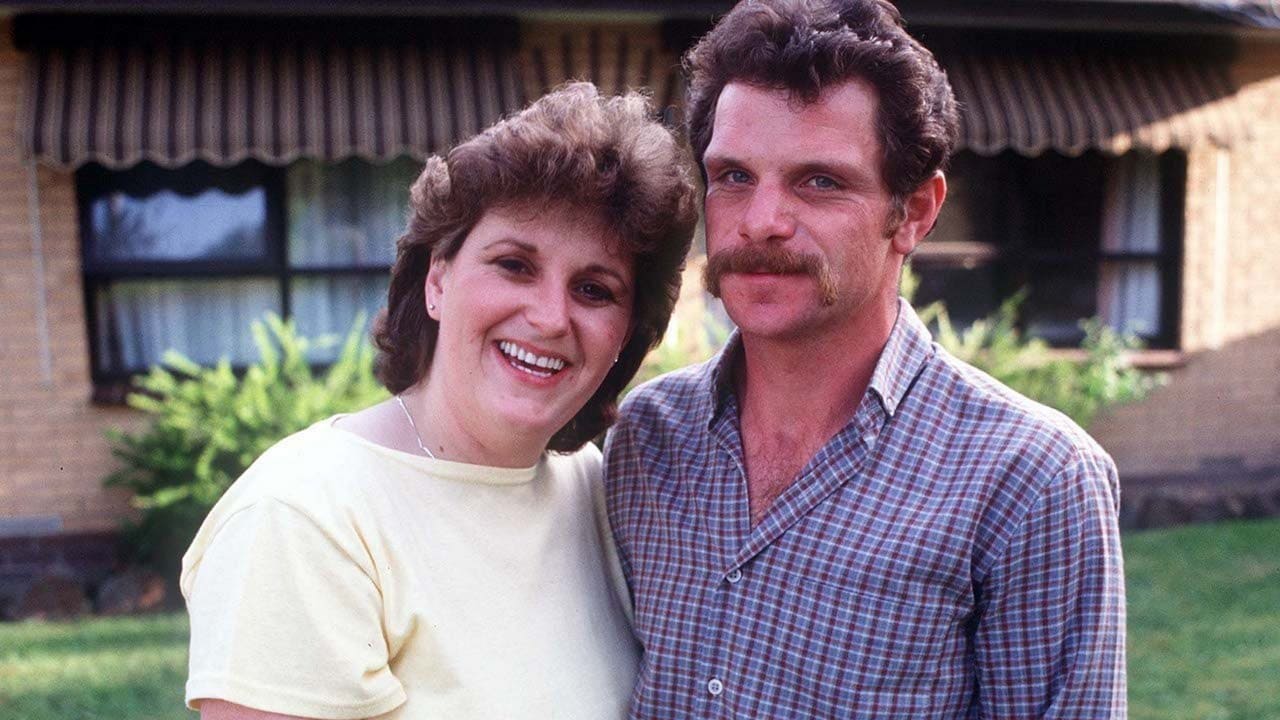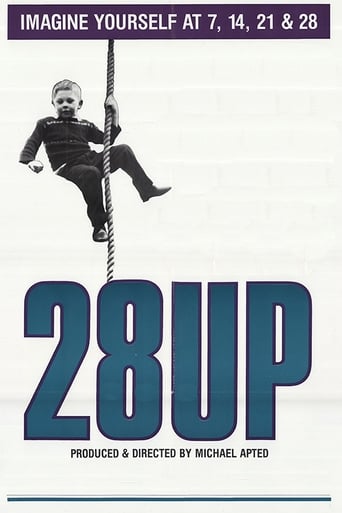

Tied for the best movie I have ever seen
... View MoreOne of the worst ways to make a cult movie is to set out to make a cult movie.
... View MoreA film of deceptively outspoken contemporary relevance, this is cinema at its most alert, alarming and alive.
... View MoreA clunky actioner with a handful of cool moments.
... View MoreI can't stop being amazed at how riveting these "Up" documentaries are. Once again, without any music, dramatization tricks or cinematic effects, only real people talking about life and love, the film can be as captivating as any drama or adventure. It IS an adventure to some degree, with life as a backdrop and adversity as a natural antagonist.And there was an interesting statement made by Neil, perhaps the most troubled and fascinating subject, he said that he envisioned God as an old Testament figure, sometimes "benevolent", sometimes "needlessly unkind", always "unpredictable". I said about Neil that he always seemed to provide overviews proved by the others' experiences. In this case, it is true because basically, you can see how destiny was benevolent to most of the "Up" persons, even some I didn't expect.Many of them had found love and marriage, Tony; the ex-jockey has been driving cabs for all these years and has two children, his happy-go-lucky nature and the many encounters with people from different classes allowed him to broaden his mind and soften his heart. Nicholas is a physician in the USA, Paul started a building trade and raised a family in Australia, after going for a road trip across the Bush with his wife. Not all the marriages look happy though, Peter seems to have a rather 'disillusioned' vision and you can't really feel sparkles of love exuding from his wife's words. There's still a lack of contentment.But the real 'miracle' came from Suzie. It's weird but in my previous review, I thought Jackie was going to have a large family and Suzie to be a disenchanted, embittered spinster. But Jackie decided not to have any children (despite an early marriage) and Suzie got married two years after the "21 Up" episode, has two children and is quite happy. Simon is happy too with twice more children, whom he provides a shelter of love and discipline, and perhaps the most valuable thing he always lacked: a parents' presence. And he also kept his job in the meat locker, not the most glamorous occupation, but it makes end meet, he knows everybody and everybody knows him. Why change now?Simon is happy the way he is, and he still doesn't think much about money. According to him, there's nothing that money will buy. Happiness depends on the goals you've set. It's even harder to disagree with him since 28 seems to be the age where everyone has found the meaning to their lives or roots for stability. Sue said that a marriage shouldn't be too early because once you get married, you stop being yourself and start to reason in terms of partnership. But some found their real balance in marriage, and some, like Neil, have hard times even co-existing with themselves. Neil is totally disenchanted and have definitely abandoned any attempt at stability or suburban comfort. His case proves that happiness isn't a matter of grammar or comprehensive school, of being rich or poor, it really depends on your personal goals and the way you grasp from the start who you really are. Sometimes, you've got to know who you are to know what you need, and maybe the real tragedy is not to able to know who you are. This is perhaps the existential dilemma revealed by the film, and that makes it, so far, the most pivotal.Indeed, how can we know exactly who we are. Looking at these kids at the age of 7, or 14, we become like sorcerer's apprentices, trying to establish patterns "this one will struggle", "this one will be happy", But life is unpredictable or for most people. Two of the posh kids didn't want to take part of the interviews, John and Charles. No commentator was surprised a bit by John, Charles was far more interesting fellow, but from the start, John was so overly confident, he knew his future school, job and everything went exactly as planned, he declined to be interviewed at 28, stating that he was fully satisfied and doesn't have much more to say. The boy always seemed so precocious, ahead of time and maybe that's how he ended up succeeding in every project. But for some reason, I wish I would still see him at 35 and check if anything happened to vacillate the edifice of his self-confidence. I doubt he'd live all his life in autopilot mode. But that's how it works, some things we see coming, some surprise us in a pleasant, others in an unpleasant way. And I found myself trying to figure out what will happen to these persons at 35.I keep in mind that they are from my parents' generation, and when I was born, most adults I knew were married with children, no one really questioned his existence, the way we millennials (or some Gen X-ers) did. Watching this, I realized that at the age of 28, although I was longing for professional stability, I also had many dreams about becoming a filmmaker and screenwriter and collected dates before I would find the 'right' one. Seven years after, I realize that I had all it took to be happy butwas too blinded to realize it.And the "Up" series gives you an idea of the belated blinding effects, from little details of your past. You can spot some early hints; the way some kids are overly protected, the lack of love that can work as both a driver or an obstacle. I'm not in a situation I dreamed to be when I was 7, 14 or 21 but I'm still the same guy and whatever actions lead me to that situation were driven by interpretations of life gathered from my past experiences. So how did I end up that way?In fact, that could be the central question of the documentary, like an existential reading of "what happened?"
... View MoreThe highlights here are Nicholas and his relocation to Wisconsin and Neil continuing down the spiral of depression. Other than that, most of the subjects have just settled into comfortable, and somewhat mundane, lives. I was disappointed not to get more of John's douchiness, but he declined to be interviewed, as did one of the other rich (but far less douchey) kids. It's amusing to see the way Apted keeps trying to badger his subjects into expressing some kind of rage against the upper class, yet they're having no part of his agenda. They all (with the exception of Neil) seem quite content with their standing. I've decided to soldier on with the series, mostly because I've already invested so much in it, but I also remain curious about a few of the subjects.
... View MoreI originally saw 49Up, which led me to want to see 7Up and 7 plus 7. And I liked 21UP enough to want to see 28UP. And this one, for whatever reason, was a bore. Whether that's a function of what is happening to the people at 28, or a function of Apted's direction and editorial choices, I don't know. All I know is that I was pretty bored within the first 20 minutes of the picture, and at over 2 hours and 15 minutes, I knew I still had a long way to go.Of course Neil is the most compelling of the players, and I got a kick out of Suzi's transformation from 21 to 28! But other than that, I thought it was all pretty boring.I'm sure I'll see 35UP and 42UP to catch up to the series, but after 28UP, I'm much less motivated to do so.
... View MoreFilmmaker Michael Apted's pet project for British television (released theatrically in several countries) is an occasionally fascinating, sometimes boring documentary which spans many years as Apted interviews a handful of British schoolchildren in the 1950s, catching up with them again eight years later and so on until the kids have reached the age of 25. For the sake of cinema, it is a shame that the subjects whom Apted initially chose for his portrait turned out to be such colorless personalities. There are a few tragedies which unfold with the heartrending beauty of fictional melodrama, yet this installment runs out of intriguing moments long before it is over. Apted is to be commended, nevertheless, for a brilliant cinematic idea. Followed in due time by "35 Up", "42 Up", "49 Up". **1/2 from ****
... View More